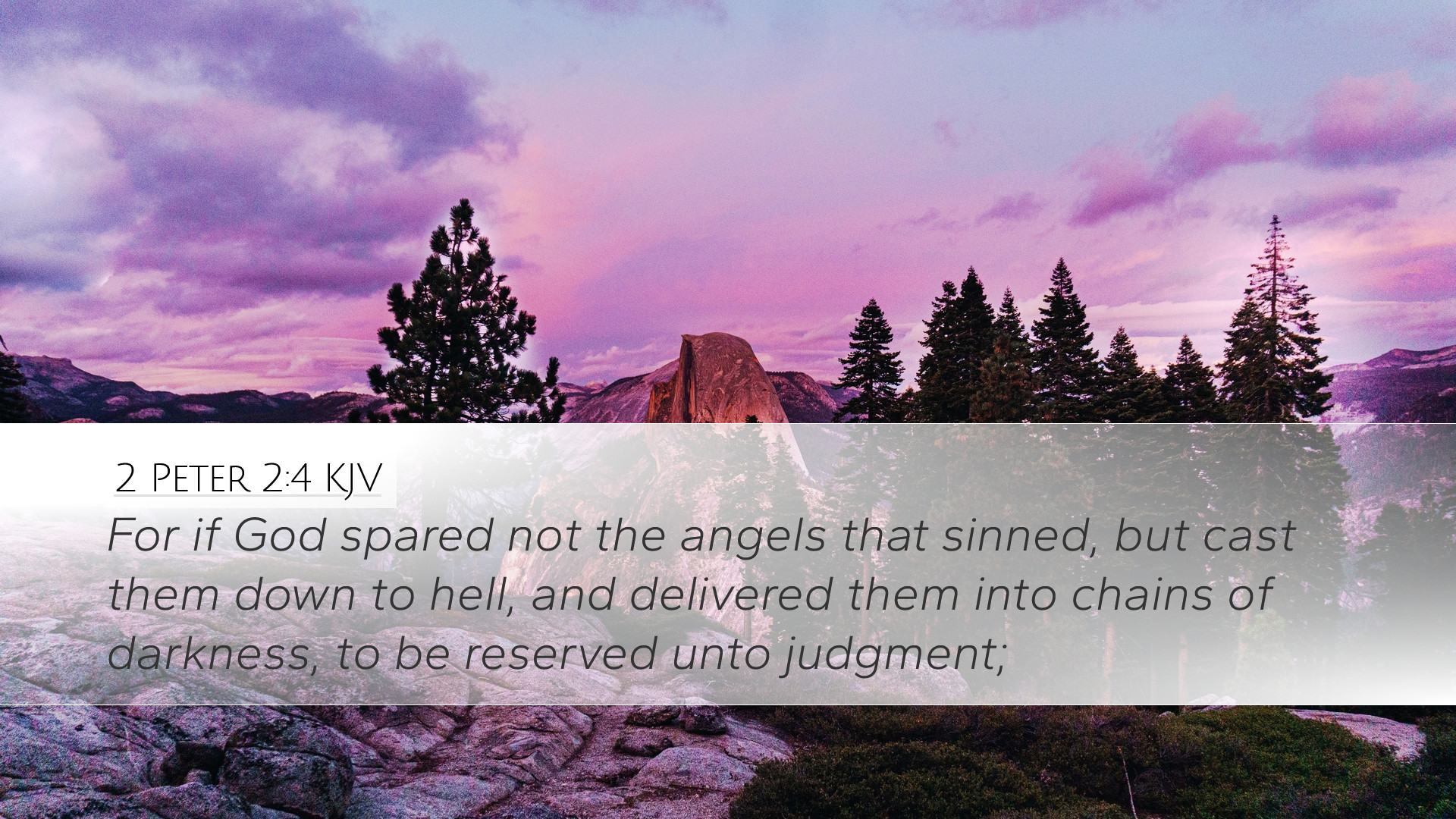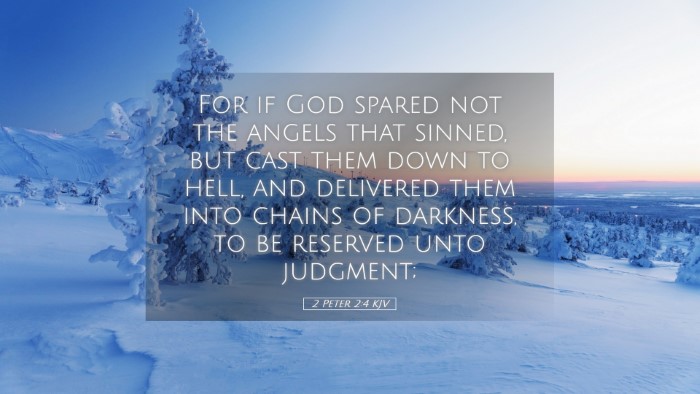Old Testament
Genesis Exodus Leviticus Numbers Deuteronomy Joshua Judges Ruth 1 Samuel 2 Samuel 1 Kings 2 Kings 1 Chronicles 2 Chronicles Ezra Nehemiah Esther Job Psalms Proverbs Ecclesiastes Song of Solomon Isaiah Jeremiah Lamentations Ezekiel Daniel Hosea Joel Amos Obadiah Jonah Micah Nahum Habakkuk Zephaniah Haggai Zechariah Malachi2 Peter 2:4
2 Peter 2:4 KJV
For if God spared not the angels that sinned, but cast them down to hell, and delivered them into chains of darkness, to be reserved unto judgment;
2 Peter 2:4 Bible Commentary
Commentary on 2 Peter 2:4
Verse Overview: 2 Peter 2:4 states: "For if God did not spare angels when they sinned, but cast them into hell and committed them to chains of gloomy darkness to be kept until the judgment." This verse serves as a stark reminder of divine judgment and the consequences of sin. It also establishes a precedent for understanding God's justice.
General Theme
This passage illustrates the seriousness of transgression against God. It presents a contrast between God's mercy and His judgment, emphasizing that even heavenly beings are not exempt from repercussions for rebelling against divine authority.
Insights from Commentaries
Matthew Henry's Commentary
Matthew Henry highlights that this verse serves as a warning to those who tread the path of sin. He notes the following:
- Divine Judgment: Henry emphasizes that God's judgment is impartial—if the angels, created beings of great power and glory, did not escape punishment for their rebellion, neither shall humans expect to do so.
- The Nature of Angels: He points out that angels possess a greater nature than humans, and their fall showcases that even the highest orders are not beyond judgment.
- Chains of Darkness: The imagery of "chains of gloomy darkness" serves to illustrate the severity of their punishment—far from mere separation from God; it is a state of confinement and despair.
Albert Barnes' Notes on the Bible
Barnes provides further analysis on this verse, breaking it down into crucial components:
- Historical Context: He references the historical aspect of angelic rebellion as seen in Isaiah 14:12-15 and Ezekiel 28:12-19, indicating the consequences faced by those who oppose God's will.
- Implications for Believers: Barnes stresses the lesson for believers: the same God who judged angels will also judge unrepentant human sinners. This is a wake-up call to pursue holiness and to avoid the paths of evil.
- Nature of Hell: He expounds on the nature of the punishment described, noting that it reflects a state of torment and separation that should invoke a sense of urgency and seriousness in the hearts of those who read the scripture.
Adam Clarke's Commentary
Adam Clarke takes a philosophical approach while maintaining theological clarity:
- God’s Justice and Mercy: Clarke asserts that this verse reveals both God's justice in executing judgment and His mercy in allowing opportunity for repentance to the living.
- Lessons for Apostasy: He notes that the punishment of angels serves as a narrative caution against apostasy. The reader is encouraged to recognize the seriousness of turning away from the truth and grace offered in Christ.
- The Condition of Sinning Angels: Clarke elaborates on the state of the angels—the chains symbolize not just punishment but also serve as a means to prevent any recurrence of their offenses.
Theological Implications
Collectively, these insights stress several theological considerations:
- Judgment and Accountability: The verse provides profound implications about God's nature, reinforcing that all beings, regardless of their position, are accountable to His holiness.
- Grace and Repentance: There is a clear delineation between grace and judgment; the present understanding of God's patience should invoke a serious response towards repentance, as the time for judgment is certain.
- Anticipation of Final Judgment: This passage serves to elevate our understanding of eschatology, reminding the faithful of the forthcoming final judgment where all will be held accountable for their actions.
Practical Application
For pastors, students, and scholars, the reflections on this verse encourage several practical applications:
- Preaching Justice and Mercy: In sermons, emphasize both aspects of God's nature—His readiness to forgive and His commitment to justice.
- Continuing Study of Scripture: Encourage continual study of biblical principles about sin, judgment, and grace, using this verse as a foundation for understanding God's overarching plan for humanity.
- Call to Righteous Living: Use the testimony of this scripture to motivate congregations towards holy living, illustrating the consequences of turning away from God's commandments.
Conclusion
This comprehensive examination of 2 Peter 2:4 reinforces the essential Christian teachings about judgment, accountability, and grace. It serves as both a warning and a call to faithful living. As we understand the severity of divine judgment illustrated through the fate of the angels, we are urged to maintain our commitment to the truth and grace of the Gospel.


